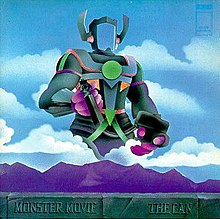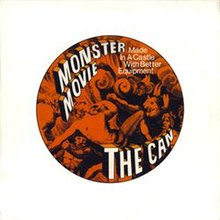Monster Movie (Can album)
| Monster Movie | ||||
|---|---|---|---|---|
 | ||||
| Studio album by | ||||
| Released | 2 August 1969[1] | |||
| Recorded | July 1969 | |||
| Studio | Schloss Nörvenich (Nörvenich, West Germany) | |||
| Genre | ||||
| Length | 38:05 | |||
| Label |
| |||
| Producer | Can | |||
| Can chronology | ||||
| ||||
| Original cover | ||||
 1969 Music Factory issue | ||||
| Review scores | |
|---|---|
| Source | Rating |
| AllMusic | |
| BBC | very favorable[5] |
| Encyclopedia of Popular Music | |
| The Great Rock Discography | 7/10[11] |
| Pitchfork | 8.7/10[7] |
| The Rolling Stone Album Guide | |
| Spectrum Culture | 5/5[13] |
| Spin Alternative Record Guide | 7/10[12] |
| Stylus Magazine | A[9] |
| Tom Hull | A−[10] |
Monster Movie is the debut studio album by German rock band Can, released in August 1969 by Music Factory and Liberty Records.
Background and recording
[edit]In 1968, Can had recorded an album entitled Prepared to Meet Thy PNOOM, which no record company agreed to release; these recordings were eventually released in 1981 as Delay 1968. Monster Movie was the group's subsequent attempt at a more commercial record.[14] The album is credited to "The Can", a name suggested by vocalist Malcolm Mooney and adopted by democratic vote. Previously the band had been known as "Inner Space", which later became the name of their recording studio. Some copies of the LP bore the subtitle "Made in a castle with better equipment",[15] referring to Schloss Nörvenich, the 14th-century castle in Nörvenich, North Rhine-Westphalia, where the band recorded from 1968–69.[16]
The image on the cover is a retrace of Galactus, as originally depicted by Jack Kirby (inked by Vince Colletta) in Marvel's Thor #134 - page 3, released in 1966.[17] [18]
Content
[edit]Monster Movie brings together elements of psychedelic rock, blues, free jazz, world music and other styles, the influence of the Velvet Underground[19][20] being particularly obvious on the opening track "Father Cannot Yell". The use of improvisation, experimentation, tape editing and layering of sounds set a standard for Can's subsequent albums in the early 1970s, which helped form the style labeled "krautrock" by the British music press. The 20-minute closing track "Yoo Doo Right" was edited down from 6 hours of improvisation.[19] The lyrics of "Mary, Mary So Contrary" are based on the English nursery rhyme "Mary, Mary, Quite Contrary".
Monster Movie was the last Can album on which Malcolm Mooney performed all of the vocals until Rite Time, recorded in late 1986 and issued in 1989.[21][22]
Track listing
[edit]All tracks are written by Can (Holger Czukay, Michael Karoli, Jaki Liebezeit, Irmin Schmidt, and Malcolm Mooney).
| No. | Title | Length |
|---|---|---|
| 1. | "Father Cannot Yell" | 7:06 |
| 2. | "Mary, Mary So Contrary" | 6:22 |
| 3. | "Outside My Door" | 4:11 |
| No. | Title | Length |
|---|---|---|
| 4. | "Yoo Doo Right" | 20:27 |
| Total length: | 38:06 | |
Personnel
[edit]- Can
- Irmin Schmidt – keyboards
- Jaki Liebezeit – drums
- Holger Czukay – bass guitar
- Michael Karoli – electric guitar
- Malcolm Mooney – vocals, harmonica
References
[edit]- ^ https://www.facebook.com/officialCan/posts/pfbid02m6LVFpwkT5boyEFERhFyzC8mMteLx3rHJgjT4oRhSA5GHZ4FoA5Lga8skSHVuLpsl [bare URL]
- ^ Bell, Max (11 April 2018). "Can: The making of landmark album Tago Mago". Louder Sound. Retrieved 23 May 2020.
- ^ Keylock, Miles (2005). "Can - Future Days". In Dimery, Robert (ed.). 1001 Albums You Must Hear Before You Die. London: Cassell Illustrated. p. 293.
- ^ Thomas, Fred. "Can - Monster Movie Album Reviews, Songs & More". AllMusic. Retrieved 1 November 2011.
- ^ Barnes, Mike (2005). "Review of Can - Monster Movie / Soundtracks / Tago Mago / Ege Bamyasi". BBC. Retrieved 23 May 2020.
- ^ Larkin, Colin (2011). "Can". Encyclopedia of Popular Music (5th ed.). Omnibus Press. ISBN 978-0857125958.
- ^ Leone, Dominique (10 November 2004). "Can: Monster Movie". Pitchfork. Retrieved 2 October 2020.
- ^ Brackett, Nathan; Hoard, Christian David (2004). The New Rolling Stone Album Guide. Simon and Schuster. ISBN 9780743201698.
- ^ Southall, Nick (7 January 2005). "Can: Monster Movie / Soundtracks". Stylus Magazine. Retrieved 1 November 2011.
- ^ Hull, Tom. "Grade List: can". Tom Hull - on the web. Retrieved 4 September 2020.
- ^ Strong, Martin C. (1998). The Great Rock Discography (1st ed.). Canongate Books. ISBN 978-0-86241-827-4.
- ^ Weisbard, Eric; Marks, Craig, eds. (1995). "Minutemen". Spin Alternative Record Guide (1st ed.). New York: Vintage Books. ISBN 0-679-75574-8.
- ^ Cole, Jake (3 September 2014). "Can: Monster Movie/Soundtracks/Tago Mago/Ege Bamyasi - Album Review". Spectrum Culture.
- ^ Czukay, Holger (May 1997). "Short History of the Can - Discography". Perfect Sound Forever. furious.com. Retrieved 1 November 2011.
- ^ Warner, Alan (2014). TAGO MAGO, London, UK; Bloomsbury Academic ISBN 978-1628921083, page 79
- ^ Cavanaugh, David (14 November 2011). "Can – Tago Mago R1971". Uncut. Retrieved 28 July 2012.
- ^ "Stan Lee". Lambiek. Retrieved 23 May 2020.
- ^ "70s Sci-Fi Art".
- ^ a b McGurk, Mike. "Monster Movie". Rhapsody. Archived from the original on 2 April 2013. Retrieved 28 July 2012.
- ^ Stubbs, Peter. "Album by Album: Can". Uncut. Retrieved 28 July 2012.
- ^ Young & Schmidt 2018, p. 311.
- ^ Young & Schmidt 2018, p. 313.
Works cited
[edit]- Young, Rob; Schmidt, Irmin (2018). All Gates Open: The Story of Can. London: Faber and Faber. ISBN 978-0571311491.
